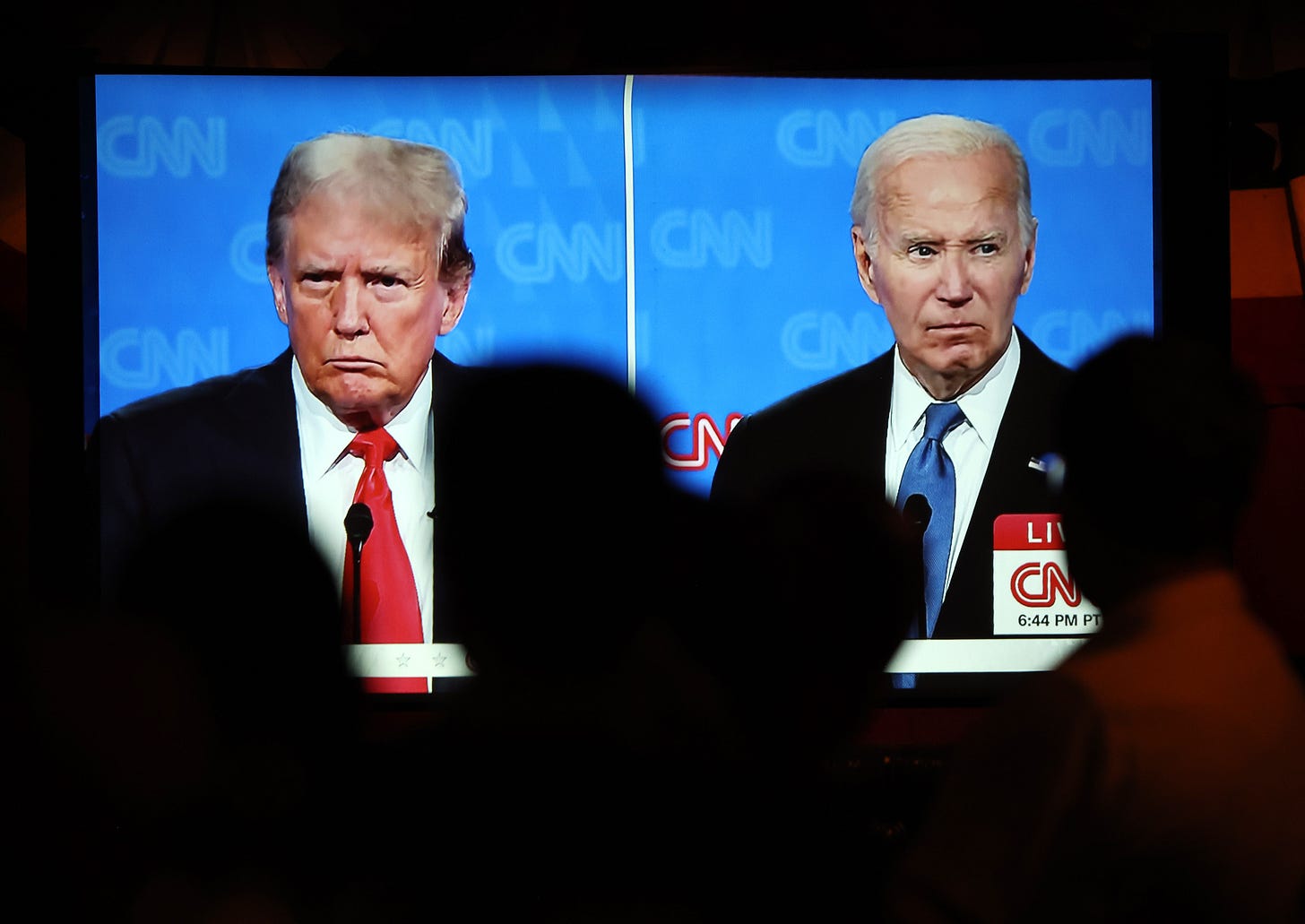Well, that happened.
Heading into last night’s presidential debate, Joe Biden had one job to do: show the country that he is physically and mentally up to the task of being president for another four years. If he got some punches in against Trump, so much the better. And given his predecessor’s obvious deficiencies, all of that was an extremely low bar to clear.
Instead, with a huge chunk of the country tuning in, Americans got to see what has been apparent to many political observers and voters for some time now: Biden has physically deteriorated—and quickly. Even for those of us who admire him personally and have closely followed his presidency and public appearances for years, his frail and elderly presentation last night was quite shocking. He routinely lost his train of thought, tripped over his words, and was difficult to hear at times, which gave Trump ample opportunity to humiliate him.
Biden’s campaign tried to brush this off by saying the president had a cold (something even a novice political operative would have known to leak to the press before the debate—not 20 minutes into it when his struggles were evident to anyone watching). Regardless of whether that was true, the impression he left for the country was indelible. And when you compare this to his performance in the 2020 debate or even his State of the Union address from just a few short months ago, it’s clear that Father Time is simply catching up to him.
Debates don’t often change the trajectory of presidential contests, and I am still not entirely convinced Biden’s showing will fundamentally alter the state of the race. Partisan attitudes are thoroughly baked in, as evidenced by the static nature of the race’s polling for months now. But there are some prominent historical exceptions to this rule, none of which are promising for Biden. For example, the 1980 debate between Democratic President Jimmy Carter (whom Biden has been compared to in many unflattering ways) and challenger Ronald Reagan presaged the latter’s eventual demise. As CNN’s Harry Enten has also pointed out, every past incumbent president who trailed in the polls going into the first debate and who then lost that debate went on to lose the general election.
If there’s a silver lining in any of this for Democrats, it’s that this debate took place before their August nominating convention, giving them time to figure out how to proceed from here. As they consider that question, the party must be mindful of the sunk-cost fallacy: the idea that they’ve come too far and invested too much in their current course that changing things would be the riskiest move of all. In fact, when the path you’re on is clearly dangerous (at best) or even fatal (at worst), not changing course can be unforgivable.
If Democrats stick with Biden, they know it’s going to be an uphill fight to November. At the national level, the race is a dead heat. Though that may sound competitive, presidential elections in the U.S. are of course not decided by the national popular vote (NPV) but by the Electoral College. And unfortunately for Biden, Trump has consistently led him (albeit by fairly small margins) across all seven battleground states that could tip the race this year.
Moreover, a tie in national polling may itself signify Biden’s precarious position. In 2020, he memorably outpaced Trump in national polling throughout the entire campaign and went into Election Day with a whopping 8.4-point lead. In the actual election, he won the NPV by a smaller, though still healthy, 4.5 points. But despite all this, he ultimately defeated Trump in the Electoral College by just 45,000 votes across three swing states.
In essence, Biden only narrowly won last time as basically every indicator favored him. This time around, many of those same indicators have turned on him, including his stubbornly dreary approval rating. At this point, Democrats know what they’re getting into if they nominate him. What they might do from here is anyone’s guess. Will there be the rare spectacle of a brokered convention in August? Will the party rally around Vice President Kamala Harris or another figure? And most importantly—will those closest to Biden try to convince him that it’s in the broader interest of his party and the country for him to cede the floor to someone else?
Given the chorus of voices from within the party apparatus—including from longtime allies—calling for him to step aside today, it seems likelier than not that there will be some serious soul-searching at the DNC and White House in the weeks ahead. But one thing is certain: staying on the path they’ve charted to this point carries clear and immense risks. Biting the bullet of change, even at this late stage, may be the only thing that saves them this November.





If it's Biden vs Trump, I will 100% vote for Biden without hesitation, but there's no question in my mind the best choice is for Biden to drop out and for Democrats to have a couple months of chaos and uncertainty before the convention. I think your average swing/undecided voter to prefer a little existential crisis from the Democrats instead of unquestionably sticking with a guy they don't like.
I'm also slightly depressed thinking that the Dem establishment won't go this route for multiple reasons. The biggest reason is that most Dems would rather lose in November and not risk their careers than make the right choice. And I think that many Dem politicians and future candidates recognize that it's a lot easier to win in 2025-27 with Trump as president than Biden.
I agree with Mr. Baharaeen's column. With no change, it looks like lemmings over the cliff or deer in the headlights. The process of finding a replacement would perhaps be chaotic but would also spark interest and excitement, it seems to me. And at least the possibility of victory.